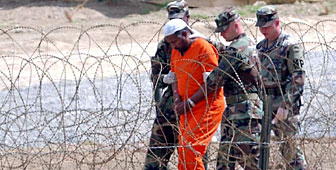
Red Cross disagrees with US over prisoners of war

The International Committee of the Red Cross (ICRC) has criticised the United States ' interpretation of how to apply the Geneva Conventions.
In a statement released on Friday night, the ICRC said it did not agree with Washington’s view of how prisoner of war status can be decided under the Geneva Conventions.
The ICRC referred to the Bush administration’s decision that Taliban members, currently held in Guantanamo Bay in Cuba, were entitled to protection under the 1949 conventions but fighters belonging to the al-Qaeda network were excluded.
“There are divergent views between the United States and the ICRC on the procedures which apply on how to determine that the persons detained are not entitled to prisoner of war status,” the Geneva-based humanitarian group said.
Prisoners of war enjoy the same rights as US soldiers and cannot be obliged under interrogation to give more than their name, rank and serial number. They should be freed at the end of the conflict unless criminal charges are made.
Third Geneva Convention
The ICRC, which is allowed to visit inmates in Cuba, also argued that the Third Geneva Convention lays down that if there is doubt about status, only a court can decide the issue.
However, a spokesman for the US state department said Washington had no such doubts as screening of the 186 inmates, currently held at the naval base, showed clearly who belonged to al-Qaeda and who were Taliban.
“All these people have been screened several times before they were taken, and after they were taken at Guantanamo. I do not think there’s any doubt in these cases,” the spokesman said.
The US administration fears prisoner of war status could prevent investigators from gathering vital intelligence needed to capture other members of the al-Qaeda network.
swissinfo with agencies

In compliance with the JTI standards
More: SWI swissinfo.ch certified by the Journalism Trust Initiative
















![The four-metre-long painting "Sonntag der Bergbauern" [Sunday of the Mountain Farmers, 1923-24/26] had to be removed by a crane from the German Chancellery in Berlin for the exhibition in Bern.](https://www.swissinfo.ch/content/wp-content/uploads/sites/13/2025/12/01_Pressebild_KirchnerxKirchner.jpg?ver=cb688ed5)














You can find an overview of ongoing debates with our journalists here . Please join us!
If you want to start a conversation about a topic raised in this article or want to report factual errors, email us at english@swissinfo.ch.